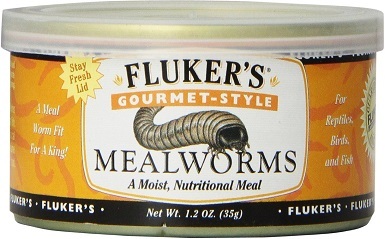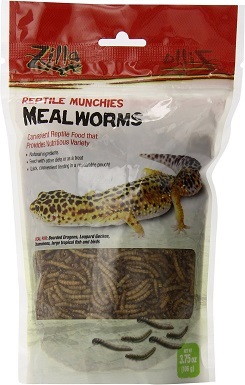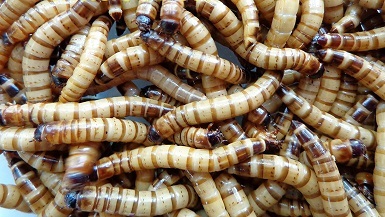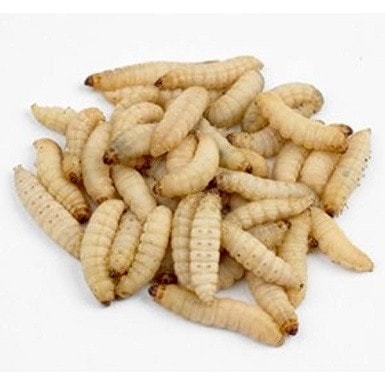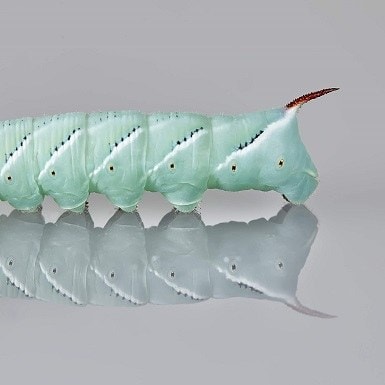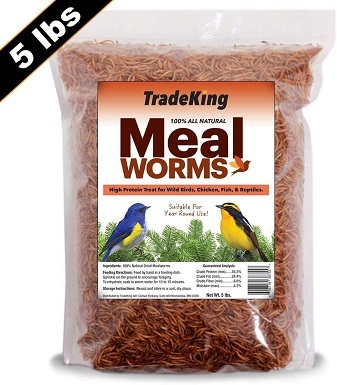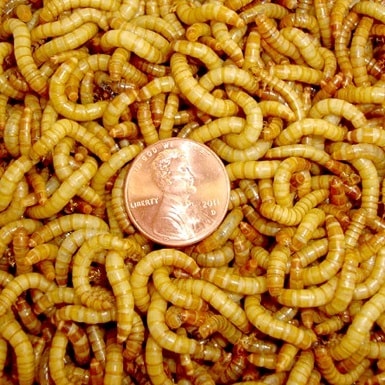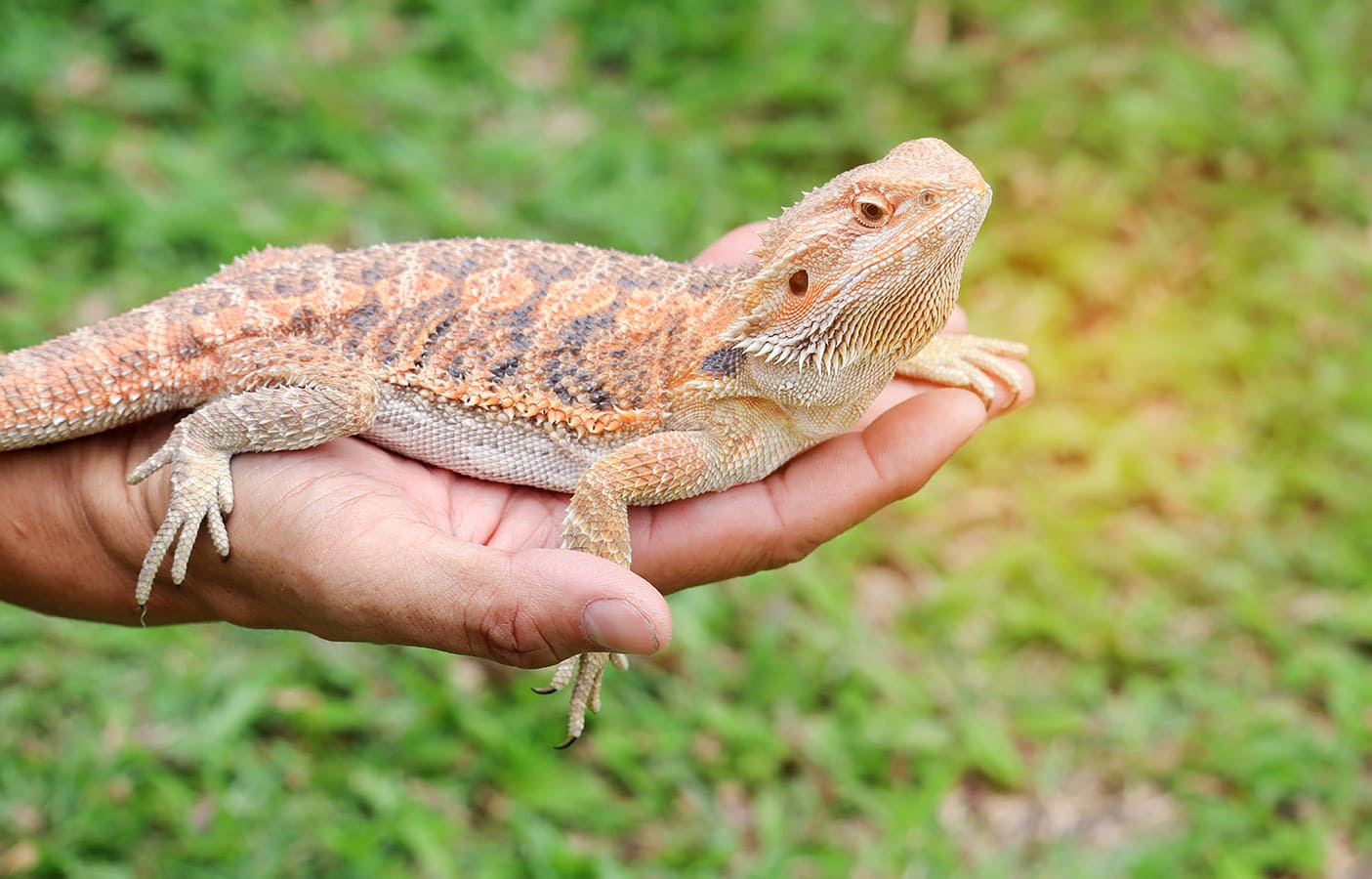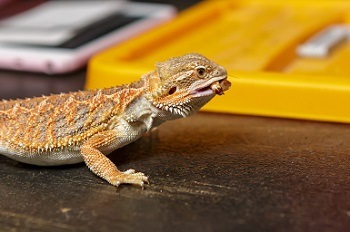
With bearded dragons, you’re not limited to just one type of worm since they’ll eat many types of insects. So, which worms should you feed your dragon? With so many different types of worms to choose from and different brands as well, it can be a difficult decision.
To make the choice easier, we’ve thoroughly tested tons of the best worms to see which ones our bearded dragons approved of. The following nine reviews will share what we learned along the way so you can provide your dragon with the same delicious worms that ours loved.
A Quick Comparison of Our Favorites in 2024
| Image | Product | Details | ||
|---|---|---|---|---|
| Best Overall |

|
Fluker's 5 Star Medley Freeze-Dried Mealworms |
|
Check Price |
| Best Value |
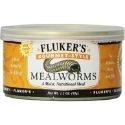
|
Fluker's Gourmet-Style |
|
Check Price |
| Premium Choice |
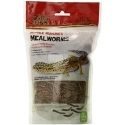
|
Zilla Reptile Munchies Mealworms |
|
Check Price |
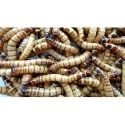
|
Critters Direct Live Superworms |
|
Check Price | |
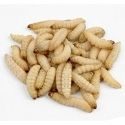
|
Galleria Mellonella Live Waxworms |
|
Check Price |
The 9 Best Worms for Bearded Dragons
1. Fluker’s 5 Star Medley Freeze-Dried Mealworms – Best Overall
Like all creatures, bearded dragons will benefit from a varied diet with multiple food sources. Flukers has kept that in mind when producing the 5-Star Medley Freeze-Dried Mealworms, a blend of three different insects that provides your dragon with the various nutrients it needs for complete health. We think these are the best overall worms for bearded dragons.
Made with mealworms, crickets, and grasshoppers, this blend is a great way to feed your dragon the insects they love to eat. It’s easy for you since everything is already put together. Just feed from this one jar and your dragon will get a varied food intake full of vital nutrients like fiber. With a minimum of 56% crude protein, you can be sure your dragon is getting adequate nutrition.
All of our dragons seemed to enjoy this food, which led us to our only complaint; it doesn’t come in a large enough size! The 1.8 ounces you get isn’t going to keep your dragon fed for very long. Still, our dragons argree this was their favorite out of all the worms they were fed.
2. Fluker’s Gourmet-Style Mealworms – Best Value
If you’re looking for the best worms for bearded dragons for the money, then we recommend trying Fluker’s Gourmet-Style Mealworms. These worms come in a small can that’s dirt-cheap. Inside the can, over 100 mealworms are waiting to keep your dragon full.
What’s interesting about these mealworms is that they’re fresh, but not alive. They’re kept moist and sealed so they remain as good as when they were living, but they’re not. This means you won’t have any worms wriggling out of your hand and onto your floor.
The downside is that these worms won’t last as long as dried worms. You’ll be able to store them for about 2 to 3 weeks in the fridge, compared to several months or longer than dried worms will store. Even live worms will store for long periods in the fridge. Still, it’s hard to beat the low-cost and convenience of these fresh mealworms, which is why they’re our pick for best value.
3. Zilla Reptile Munchies Mealworms – Premium Choice
If your number one concern is convenience, then the Zilla Reptile Munchies Mealworms may be the choice for you. These worms are dehydrated, so you won’t have to worry about any of the problems that come with feeding live insects to your lizards. Of course, not all dragons will eat dead worms, so you’ll have to see if yours will take them.
These worms have an excellent shelf life and can be stored long-term without refrigeration, making them perfect for anyone who isn’t thrilled with the idea of keeping insects in the fridge or freezer.
Though the bag weighs only 3.75 ounces, it contains a surprisingly high number of dried worms. There should be plenty to keep your dragon fed for quite some time, provided it will take dried worms!
4. Critters Direct Live Superworms, Gut Loaded
For most dragons, live worms tend to be preferred over dried ones, but they’ll eat many different kinds of worms. One worm that many dragons love that’s also packed with great nutrition is the superworm. These superworms from Critters Direct are live to provide your dragon with the best nutrition and feeding experience possible.
Though they’re available in sizes under an inch, superworms are best suited for adult dragons because they grow quickly and can be pretty large. Be careful when feeding them as superworms can pinch you if you don’t pay attention!
Superworms have softer exoskeletons than mealworms, which makes them a better choice for digestion. These superworms are even gut loaded for 48 hours before shipping, packing them full of vital nutrients that will be beneficial for your beardie. You’ll get 100 worms in a package, which you might struggle to use before they get too big. Unlike mealworms, superworms can’t be stored in the fridge; it will kill them.
5. Galleria Mellonella Live Waxworms
You may never have heard of waxworms before, but they make an excellent treat for bearded dragons. While mealworms and superworms can be fed to your dragon regularly, waxworms shouldn’t be used as a staple in your dragon’s diet, which is why these ones won’t earn a top position on our list. They’re too fatty to feed your dragon daily, though it will probably love them as an occasional snack.
Waxworms will become dormant if you store them in the fridge at 55-60 degrees. This will allow you to store them alive so your dragon can get the full nutritional benefits of eating live insects. With 50 waxworms included in a package, they should last quite a while fed to your dragon as occasional treats.
6. Amzey AY109 Fresh Mealworms
Fresh mealworms are not alive, though they do offer some of the same benefits such as superior nutrition over dried alternatives. These worms have been stored since they were killed to keep them fresh without robbing them of nutrients by freeze-drying them. Moreover, they were also steam-cleaned at high temperatures to ensure there are no harmful bacteria present.
Fresh mealworms are harder to store than live or dried worms, so these ones come in several small packages. Once you open a package, you’ll have only a short time to use the worms inside before they go bad.
Compared to other worms, the Amzey Fresh Mealworms are quite pricey. Also, keep in mind that not all bearded dragons are interested in eating food that isn’t living. Even though they’re fresh, many of our dragons wouldn’t eat these worms, so they ended up being an expensive waste.
7. DBDPet Premium Live Hornworms
Like us, bearded dragons can benefit from a varied diet rather than eating the same foods every day. One great choice for a bit of dietary diversity is hornworms, such as these Premium Live Hornworms from DBDPet. They’re perfect for an occasional treat, but we don’t recommend feeding hornworms as a staple in a dragon’s food regimen because they’re not very high in protein.
Live worms like these provide more nutrition for your dragon and they’re more fun for them to eat as well. However, storing live worms can be more difficult, especially hornworms that grow very quickly. They’re also more expensive than other worms, another reason it’s best to feed them sparingly.
These worms are guaranteed to arrive alive, making them easy to feed. You’ll get 20-30 worms in a package, ranging from 0.25 inches to 0.5 inches in length. You can easily grow them to a larger size for feeding adult dragons, but that could take a while and will require caring for the worms until they reach the desired size.
8. TradeKing Dried Mealworms
Mealworms are a staple in many captive bearded dragons’ diets, and TradeKing makes it easy to stock up on enough dried mealworms to last all year! You can choose from various bulk quantities between one and five pounds, offering a great price per serving. Of course, your dragon won’t get as many nutrients from these worms as live ones, so it may not be as great of a value per serving.
You can store these worms long-term with no refrigeration since they’re already dehydrated. However, keeping this number of worms is going to be a pain since they take up a lot of space and may go bad before you get a chance to use them all.
About half our dragons would eat these dried worms. Those aren’t great odds, so if you aren’t sure that your dragon is comfortable with dried worms, we suggest trying a smaller batch first. That way, so many won’t be wasted if your dragon won’t eat them.
9. Bassett’s Cricket Ranch Live Mealworms
We always love the value of buying in bulk, and Bassett’s Cricket Ranch Live Mealworms come with 2,100 live worms in a package, which definitely qualifies as bulk. But in this case, it’s overkill. We love the benefits that our dragon will get from eating these live worms, but the tradeoffs aren’t worth it in our eyes.
Storing 2,100 live worms is very difficult. True, you can store them in the fridge for months with no problem. But do you want to keep that many mealworms in your fridge? That’s a lot of space to sacrifice, even if you are comfortable with thousands of bugs on your food.
Since you’re getting so many worms, it’s more of an investment upfront. Granted, you’re getting a good cost per serving, but it’s going to take a very long time for a single bearded dragon to eat through 2,100 worms, and you’ll be sacrificing your fridge the entire time. Is that really worth saving a few bucks? For us, it’s not.
Buyer’s Guide: How to Choose the Best Worms for Your Bearded Dragon
Live vs Canned vs Freeze-Dried Worms
Live, canned, and freeze-dried worms all serve different purposes for your beardie. Each type comes with its own list of pros and cons.
1. Live Worms

Live worms are the best option when feeding any reptile as they stimulate the appetite. Your beardie is attracted to motion, so seeing his worms wiggling in his food bowl is more likely to make him come to investigate and eat.
Live worms encourage exercise and stimulate your pet’s natural hunting instincts. Your beardie must hunt and chase them when they’re let loose in his enclosure, providing entertainment and enrichment.
Live worms are gut load-able, meaning you can control the quality of nutrition you’re offering your pet. Gut loading is the act of feeding your beardie’s live food before he eats it. You’ll gut-load your worms with highly nutritious foods to pass those nutrients to your beardie.
The downsides of live worms are that they require a certain level of care to keep them alive. Unless you plan on feeding your beardie all his worms in one meal, you’ll need a separate container to care for them as they await their feeding time.
Though live insect retailers do all they can to ensure the safe arrival of your worms, you should expect some to arrive dead. This can happen for numerous reasons, including shipping delays or weather extremes.
Live bugs can also be difficult to handle. If you’ve ever tried to catch uneaten crickets after your beardie’s meal, you know how challenging it can be.
2. Canned Worms

Canned worms are extremely convenient as they can be kept in your pantry and don’t require care as they’re already dead. They have a relatively long shelf-life, so they’re great for emergencies.
Much of the worms’ juiciness is preserved during the canning process, so serving them to your beardie won’t cause dehydration. Canned worms are easy to find online and in stores. Some live bugs aren’t available in all stores.
Canned bugs are extremely odorant, which is a pro and a con. This is a pro for your beardie as the strong scent of these worms is appetizing, but it’s a con for us as we have to smell them while serving them.
The biggest downfall of canned worms is that they spoil within a few days of opening the can. So, while they will last a long time unopened on your shelf, you need to feed them to your beardie relatively quickly before they have a chance to spoil.
Another downside is that because these worms are already dead, they’re obviously not going to move about in your beardie’s cage. This can make your pet less interested in them, as lizards are more likely to go after moving prey than something that doesn’t move at all.
3. Dried Worms

Dried worms are convenient to feed as they last in storage for a long time and can be kept in your pantry for backup in emergencies. You can provide them one at a time without worrying about the entire container spoiling as you would with canned worms.
Dried worms are easy to find in both online and brick-and-mortar stores. Some nutritious worms are illegal to ship into certain countries when alive. Dubia roaches, for example, are one of the best feeder worms for beardies, but they are banned from importing into Canada in their live state. Canadians wanting to offer their reptiles the high-quality nutrition from these roaches can opt for the dried variety.
Dried bugs’ biggest downfall is that they contain little moisture; they can contribute to dehydration in your beardie. Reptiles often rely on their worms and veggies to provide them with some level of hydration, and without the juiciness of live or canned bugs in their diet, you may find your beardie isn’t getting the right amount of water he needs.
Dried bugs are naturally crunchy, but some varieties are so hard that chewing them becomes difficult. This can be off-putting to some beardies and even damage their jaws or teeth in extreme situations.
What Are the Best Worms for Bearded Dragons?
Not all worms are created equal. While your beardie can benefit from all the worms in our above reviews, not all are meant to be used as staple insects.
Staple worms are so nutritious that your beardie can eat them at every meal. They should be gut loaded for at least a full day before feeding your pet to ensure you provide the most nutritious meal possible.

The best feeder worms include:
Treat worms are those you can offer your beardie occasionally when you feel he’s due for a tasty treat. The bugs should not be fed as staples as they don’t carry the high nutrition that the feeder worms mentioned above do and are often fattier and harder to digest in large quantities.
The best treat worms include:
*Best served only to adults as young beardies may have problems digesting the tough chitin exterior.
Nutritional Breakdown of the Best Worms for Beardies
As mentioned above, not all worms in our buying guide are meant to be served daily. Some are best saved for a rainy day, while others are okay in moderation as a treat. Let’s take a closer look at the nutritional breakdown for each of the worms you’ve read about today.
1. Mealworms
Mealworms are the larvae of the yellow mealworm beetle. They’re high in water, providing your beardie with an adequate source of hydration. Mealworms are safe to add to an adult beardie’s diet but are not recommended for young lizards as the hard exterior can be difficult to digest and may cause impaction. Because they’re high in fat and their calcium-to-phosphorus ratio is generally inadequate, they’re best used as an occasional treat and not a staple protein.

2. Superworms
Superworms are the larvae of darkling beetles. They’re five times larger than mealworms but are safe to offer adult beardies. Their hard exoskeleton makes them inappropriate to feed baby or juvenile beardies as they can be difficult to digest and cause impactions. They provide a good source of moisture, but because they’re high in fat and phosphorus, they should only be used as a treat.
3. Waxworms
Waxworms are the caterpillar larvae of wax moths. They’re small and super soft insects that are easy to consume and digest. However, like superworms and mealworms, waxworms are very high in fat. They should only constitute a small portion of your pet’s diet.

4. Hornworms
Hornworms are the larvae of the five-spotted hawk moth. They are a popular feeder worm for beardies as their bright bluish-green color is stimulating for picky eaters. They’re low maintenance and provide a great source of hydration. Additionally, their very soft exoskeleton ensures your beardie has no digestive issues. Please note that they are high in water, so they can cause watery stools if fed in excess.
A Word on Calcium to Phosphorus Ratios
Reptiles need twice as much calcium as they do phosphorus. This is because they need calcium to properly metabolize their phosphorus. When your beardie doesn’t have enough calcium, his body will steal it from his bones and other stores. This calcium robbery can cause metabolic bone disease (MBD), a painful condition that can rob your beardie of his quality of life.
Most insects contain more phosphorus than calcium, so this is where calcium dusting comes into play. Calcium supplements come in powdered forms that you can dust on your feeder insects before each feeding.
Conclusion
Worms offer a diverse and nutritional food source for bearded dragons. After feeding our dragons as many different worms as we could find, we’ve narrowed down the choices to three that our dragons seemed to love the most. You read about them in our reviews, but we’re going to quickly summarize them once more to drive the point home.
For our dragons, we prefer the Fluker’s 5-Star Medley Freeze-Dried Mealworms. This mix provides several whole food sources packed with healthy fiber and a minimum of 56% crude protein.
When we’re looking for the best value, we choose Fluker’s Gourmet-Style Mealworms. These fresh worms offer the ease-of-use you get with dead worms and the nutritional benefits of live worms for a very affordable price.
Our premium choice recommendation is the Zilla reptile Munchies Mealworms. These dehydrated mealworms come in a large bag with plenty of worms to feed your dragon for a long time. They can be stored without refrigeration and have an excellent shelf life.
Featured Image Credit: Sergphotocool, Shutterstock







